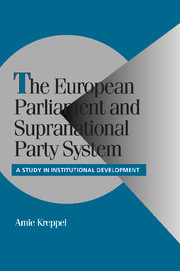Book contents
- Frontmatter
- Contents
- Figures
- Tables
- Acknowledgments
- 1 INTRODUCTION: THE EUROPEAN PARLIAMENT AND THE INSTITUTIONAL EVOLUTION OF LEGISLATURES
- 2 THEORIES OF LEGISLATIVE DEVELOPMENT AND THE EUROPEAN PARLIAMENT
- 3 THE DEVELOPMENT OF THE PARTY GROUP SYSTEM AND THE PARTY GROUPS
- 4 THE HISTORY OF THE EUROPEAN PARLIAMENT
- 5 THE INTERNAL DEVELOPMENT OF THE EUROPEAN PARLIAMENT: FROM COLLEGIALITY TO CONFLICT
- 6 THE DEVELOPMENT OF THE SUPRANATIONAL PARTY GROUP SYSTEM: CONFLICT AND COOPERATION IN THE COALITION FORMATION PROCESS
- 7 COOPERATION AND CO-DECISION: THE ROLE OF IDEOLOGY AND RULES
- 8 THE INTERNAL DEVELOPMENT OF THE SUPRANATIONAL PARTY GROUPS: AN ELUSIVE GOAL
- 9 CONCLUSIONS: UNDERSTANDING THE DEVELOPMENTAL PROCESS
- Appendices
- Bibliography
- Index
- Titles in the series
4 - THE HISTORY OF THE EUROPEAN PARLIAMENT
Published online by Cambridge University Press: 18 December 2009
- Frontmatter
- Contents
- Figures
- Tables
- Acknowledgments
- 1 INTRODUCTION: THE EUROPEAN PARLIAMENT AND THE INSTITUTIONAL EVOLUTION OF LEGISLATURES
- 2 THEORIES OF LEGISLATIVE DEVELOPMENT AND THE EUROPEAN PARLIAMENT
- 3 THE DEVELOPMENT OF THE PARTY GROUP SYSTEM AND THE PARTY GROUPS
- 4 THE HISTORY OF THE EUROPEAN PARLIAMENT
- 5 THE INTERNAL DEVELOPMENT OF THE EUROPEAN PARLIAMENT: FROM COLLEGIALITY TO CONFLICT
- 6 THE DEVELOPMENT OF THE SUPRANATIONAL PARTY GROUP SYSTEM: CONFLICT AND COOPERATION IN THE COALITION FORMATION PROCESS
- 7 COOPERATION AND CO-DECISION: THE ROLE OF IDEOLOGY AND RULES
- 8 THE INTERNAL DEVELOPMENT OF THE SUPRANATIONAL PARTY GROUPS: AN ELUSIVE GOAL
- 9 CONCLUSIONS: UNDERSTANDING THE DEVELOPMENTAL PROCESS
- Appendices
- Bibliography
- Index
- Titles in the series
Summary
The position of the European Parliament (EP) within the broader European community has changed significantly over time. As the competencies and breadth of the European Communities, and then the European Union, expanded, the EP pressed for, and adapted to, increases in its powers. Before we explore the adaptive process of the EP it will be helpful to review the evolution of the EU as a whole and the changing role of the EP within it.
A full understanding of the history of the EP requires that we examine its immediate predecessor, the Common Assembly (CA) of the European Coal and Steel Community, and the political environment that led to the initial creation of the European Economic Community (EEC). Following this, the general history of the EP will be divided and discussed in four sections: the early years (1958–1969), which include the initial organization of the Parliament and the institutional role of the EP as established by the Treaties of Rome; the first period of development (1970–1978), during which the EP gained partial control over the budget and direct elections were established; the second period of development (1979–1986), when the first direct elections were held, the EP's power of delay was reinforced, and the Single European Act was created; and, finally, the most recent period of development (1987–1999), which includes the acquisition of true legislative power by the EP through the implementation and reform of the cooperation and co-decision procedures. I focus in particular on the political role of the EP and its relationship vis-à-vis the other Community institutions during each of these periods.
- Type
- Chapter
- Information
- The European Parliament and Supranational Party SystemA Study in Institutional Development, pp. 52 - 90Publisher: Cambridge University PressPrint publication year: 2001



